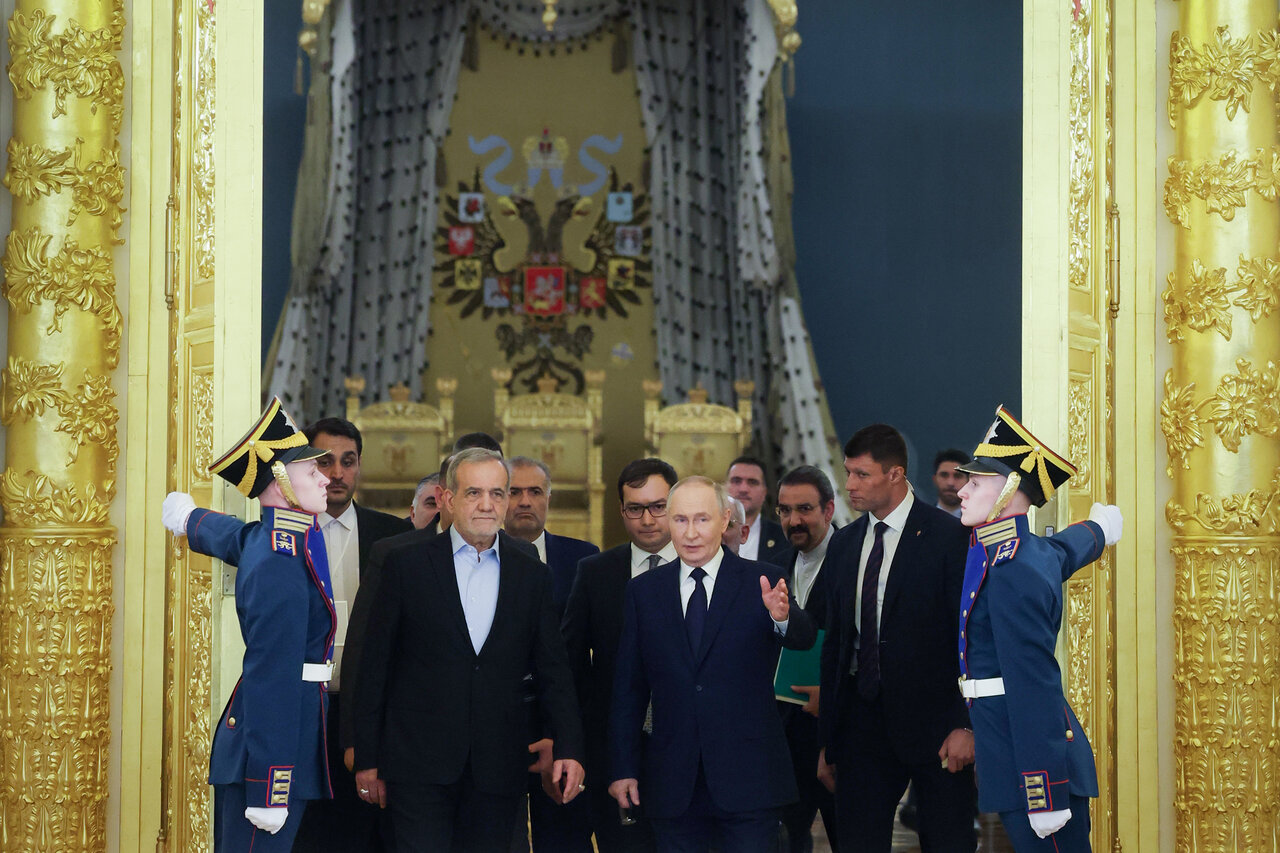Iran and Russia sign strategic cooperation treaty

TEHRAN – The presidents of Iran and Russia inked a comprehensive strategic partnership agreement during an official signing ceremony in Moscow on Friday.
Speaking at a joint press conference following the signing event, Masoud Pezeshkian said the treaty will open a new chapter in relations between the two countries. He noted that the newly discussed agreements focus on enhancing cooperation across various sectors and that it specifically includes increasing the level of exchanges by utilizing the capacities within the Eurasian Economic Union.
Beyond economic ties, Pezeshkian underscored the crucial role of bilateral collaboration in addressing regional security challenges. He emphasized the importance of improving bilateral cooperation on issues such as the fight against extremism, terrorism, and organized violence.
The president expressed optimism about the future trajectory of the two countries’ relationship and underscored Russia's significance in Iran's foreign policy, asserting that "Russia is an important country in the world”.
The Iranian leader also described his discussions in Moscow as "positive," focusing on regional and international cooperation. The topics covered included the developments in the West Asia region, the Caucasus, and peace and stability in Afghanistan.
Recognizing the shared membership of both countries in the Shanghai Cooperation Organization (SCO) and the BRICS group, Pezeshkian noted that the development of mutual relations will have a leading impact on strengthening regional convergence and serving common interests.
What does the Russia-Iran strategic partnership treaty encompass?
Furthermore, the president reiterated Iran's stance on conflict resolution, stating that "war is not a proper solution to issues," and expressing Tehran's support for "the establishment of peace between Russia and Ukraine through negotiations." He also added a clear critique of Western policies stating that “We firmly believe that Western countries should respect the security concerns of other countries and avoid imposing their own excessive demands on others.”
For his part, Vladimir Putin said Tehran and Moscow heed the developments in Ukraine and have intelligence cooperation in accordance with international law and the United Nations Charter.
Putin said the two sides have very close stances on the developments in West Asia and the Caucasus which will be beneficial to all countries. Iran and Russia do not interfere in the internal affairs of the countries and stand against illegal sanctions against them, he noted.
The Russian president emphasized strengthening trade relations with Iran, mentioning that discussions with Pezeshkian focused on boosting trade exchanges.
Elsewhere in his remarks, Putin also expressed hope for a lasting ceasefire in Gaza leading to long-term stability, and called for a comprehensive solution to the Israeli-Palestinian conflict. Finally, Putin affirmed Russia's support for resolving issues in Syria while respecting its territorial integrity.
How the Strategic Partnership Treaty came to be
Over the past two to three decades, the relationship between Iran and Russia has evolved into a significant collaboration that now spans crucial areas like economics, trade, security, and energy. This strengthened alliance, occurring amidst a changing global landscape, necessitated a formal update to an existing accord signed in 2001.
The Tehran Times understands that the strategic cooperation agreement signed on Friday was the culmination of a multi-year effort that began in 2019. Under President Ebrahim Raisi, Iran took the lead in crafting the text of the treaty. Iranian officials and analysts convened in 35 meetings over six months and factored both the evolving international environment and the strategic goals of each country.
The draft was finally revised by the Iranian Ministry of Foreign Affairs in July of 2023, which incorporated input from the Presidential Office's Legal Deputy and the Supreme National Security Council, before sending it to Russia. Following the exchange of drafts and numerous rounds of discussions, officials from both nations met in Moscow in June of 2024 to finalize the text.
Leave a Comment